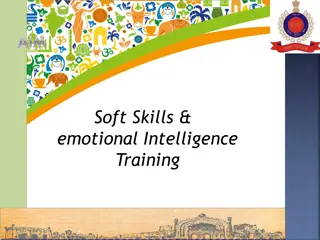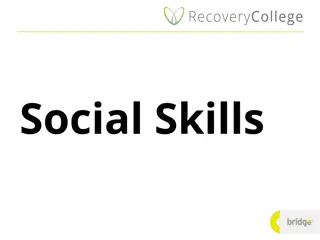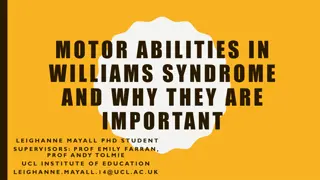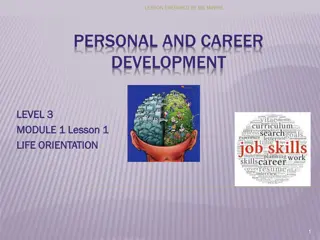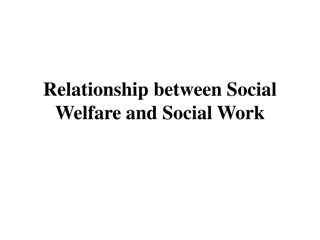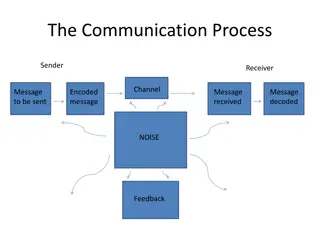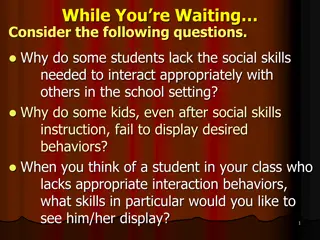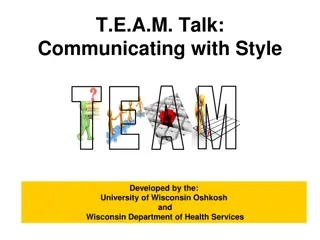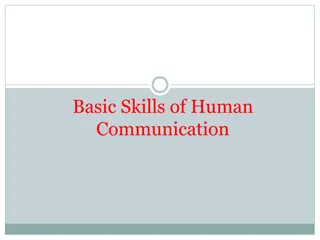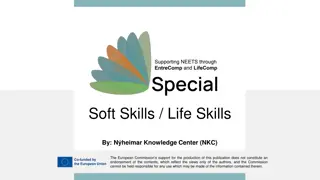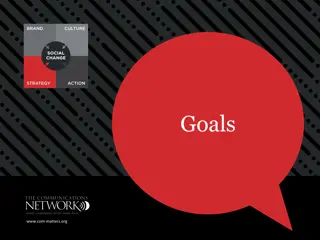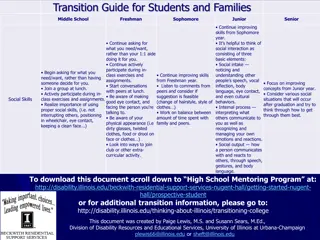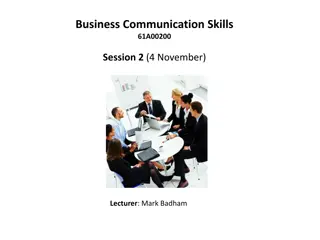Enhancing Social Skills and Communication Abilities
This presentation focuses on improving social skills and communication, including non-verbal cues, body language, and eye contact. It highlights the importance of understanding social situations and provides insights on navigating interactions effectively. The session offers practical tips for individuals seeking to enhance their social abilities and connect with others more confidently.
Download Presentation

Please find below an Image/Link to download the presentation.
The content on the website is provided AS IS for your information and personal use only. It may not be sold, licensed, or shared on other websites without obtaining consent from the author. Download presentation by click this link. If you encounter any issues during the download, it is possible that the publisher has removed the file from their server.
E N D
Presentation Transcript
Social Skills and Communication Hub Presentation
This session will look at: Social skills Non verbal communication Conversations Socialising Social skill development Alot of our material has been obtained from the national autistic society, www. Autism .org .uk
Social skills Social skills are used when communicating with other people. They involve knowing how to act in a certain social situation. Good social skills can improve and maintain relationships and help us to make friends.
Social skills You might find social situations difficult. Other people appear to know, intuitively, how to communicate and interact with each other. You may feel that other people don't understand you.
Body language Can you easily read the person you are communicating with? Can you spot if someone is happy, sad, frustrated, confused, cross, irritated, embarrassed?
Non verbal communication It is easier to read someone when as well as looking at their face, you also listen to the tone of their voice is their voice raised? Is it loud? Are they breathing quickly and spitting words out?
And looking at their body language are they looking at their watch? Have they moved away from you? Have they turned away? Practice at home looking at people body language in photos and on You Tube
Eye contact Although eye contact can be difficult to do if you have Autism, poor eye contact with the person you are communicating with can result in misunderstandings. This is because you need to be watching each other in order to read and understand each other more accurately. It allows you to check their expression. It shows you are listening to them and valuing them, even if eye contact is only made once every so often during a conversation. Find your comfortable level of eye contact.
Communication People with autism can find socialising and communicating challenging. Many really do want to make friends and form relationships but find it difficult to do this and sustain it. There may be difficulty understanding social cues and knowing when to speak or listen, and facial expressions can be hard to read resulting in social isolation.
Most people on the autism spectrum have difficulty interacting with others. They may have difficulty with : responding, using interaction to be sociable. Understanding and relating to other people initiating interactions.
Conversations People with autism have different needs and have developed different skills. The next slides show various tips when communicating.
How can I approach someone? If the person you would like to talk to is already talking to someone else, it may be better to speak to them later on when they are free. If the person is free or is in a conversation with someone you know, approach the person. Stop when you are about an arm's length away and face them to talk to them.
How can I start a conversation? Saying 'Hello' or 'Excuse me' is usually a good way to get someone s attention. How you greet someone depends on who you are speaking to or where you are. For example, you might say 'Hiya' to one of your friends but 'Hello' or Good Morning to your boss or a customer.
Using the person's name before or after your greeting will help them to know you are talking to them. Here are some general conversation starters to use at the beginning of the conversation rather than starting on a certain topic :
How are you? It's nice to see you. Did you enjoy the film/concert/TV programme? (if you know they have watched one). You can prepare by writing down some other general questions and topics that you can use when you are talking to other people.
What can I talk about? Examples of other generic topics that are usually appropriate are : The weather. TV programmes. Films
Examples of topics that are usually more sensitive or thought of as inappropriate are : Critical comments about a the way a person looks, eg saying that you do not like what they are wearing. Money, eg asking someone how much money they earn. Politics A persons age Avoid talking about these if you don t know the person well.
The more times you meet the same person, the more you can develop conversations about common interests. Talk about things that you know the other person likes as well as the things that you like. If you both like the same things then you could talk about these. Take it in turns when talking to people. Let them answer your questions and give them a chance to ask you a question in return if they want to.
Talking about feelings People with autism may find it difficult to know how they themselves are feeling or how someone else is feeling. They may not know what to say to a person especially when the other person may not actually say how they feel or say what is worrying them. Autistic people often find it difficult to read other people s body language and facial expressions.
How do you recognise when to end a conversation? Watch out for signals that someone wants to end a conversation with you. These may include: not asking questions back looking around the room Yawning, looking at their watch saying they have got to go and do something.
Making friends and socialising Some people with autism prefer not to socialise with other people, or others enjoy friendships, but find it very difficult to make friends. Having friends means you can go out with them and have a chat, being able to share common interests or discuss your problems with them. It is important to avoid social isolation if you want contact with others.
Clubs and groups One option is to join a club relating to a activity or hobby that you are interested in. The other members will have a common interest, often making conversation easier. Another option is to join a social group for people that have autism. Some groups take part in leisure activities, others focus specifically on developing social skills.
Courses Learning a new skill whether for pleasure or related to your employment can often lead to making new friends. Your local college might run daytime and evening courses in things like art, IT and cooking.
Issues in relationships: Difficulties interpreting non-verbal communication can result on may not being aware of how best to respond to help your partner. Not understanding some social rules of relationships, for example regularly telling a partner you love them, may seem unnecessary to some people with autism.
Some behaviour can come across as hurtful behaviour . It may also be hard for you to understand your partner's needs. They may be interested in things that seem boring to you.
It helps to have a calm, reasoned discussion about any issues. Drawing up an agreed timetable for certain activities, such as mealtimes, can help your partner to know what is going to happen when.
Friendships - Who is a real friend? It can be hard to tell if someone is a real friend or not. It maybe difficult for you to notice body language and tones of voice and these can be signs if someone is just pretending to be your friend. So called friends may go on to abuse a person with autism. This can be financial, physical or sexual abuse. This is called mate crime. Mate crimes are Disability Hate Crimes and should be reported to the police.
Someone pretending to be a friend might make unfair requests of you or put you in awkward situations might treat you less well than their other friends might play on your guilt if it helps them get their own way.
A true friend will always be kind and make you feel welcome and talk to you if they have the time will treat you as well as they treat all of their friends.
Telling people that you are autistic. If you tell people that you have autism this often helps people to understand you and communicate better with you. It is your choice whether to tell people or not but often it is considered be a positive decision. You could tell them things you d like them to know (eg that you can concentrate more on a conversation by not making eye contact) and things you d like them to do eg be more direct with you and tell you how it is as you may miss subtle cues. You could tell them where they can find out more information about autism.
Employment It could be helpful to tell your employee about your Autism diagnosis. This way, they can put reasonable adjustments in place for you and help prevent any misunderstandings in the workplace.
Social isolation Autistic people can experience social isolation. Here we will look at the possible reasons for this, and ways in which family, friends and carers can improve matters
Possible reasons for social isolation Autistic people may prefer to be on their own and enjoy their own company they may want to engage with others but lack the skills to do so they may find it difficult to maintain contacts due to a lack of social skills a bad experience in a social situation in the past need for support the person or their family, friends and/or carers may not know about suitable activities in their local area.
Encouraging social interaction Some people may need time to themselves if they find it difficult to be around others for long periods of time. It is important to respect this. But it is also worth talking about the benefits of having a network of contacts, for when they want company or need support. If you feel that you are engaging in an activity for an unusually long time (eg playing computer games), you might draw up a timetable which includes other activities.
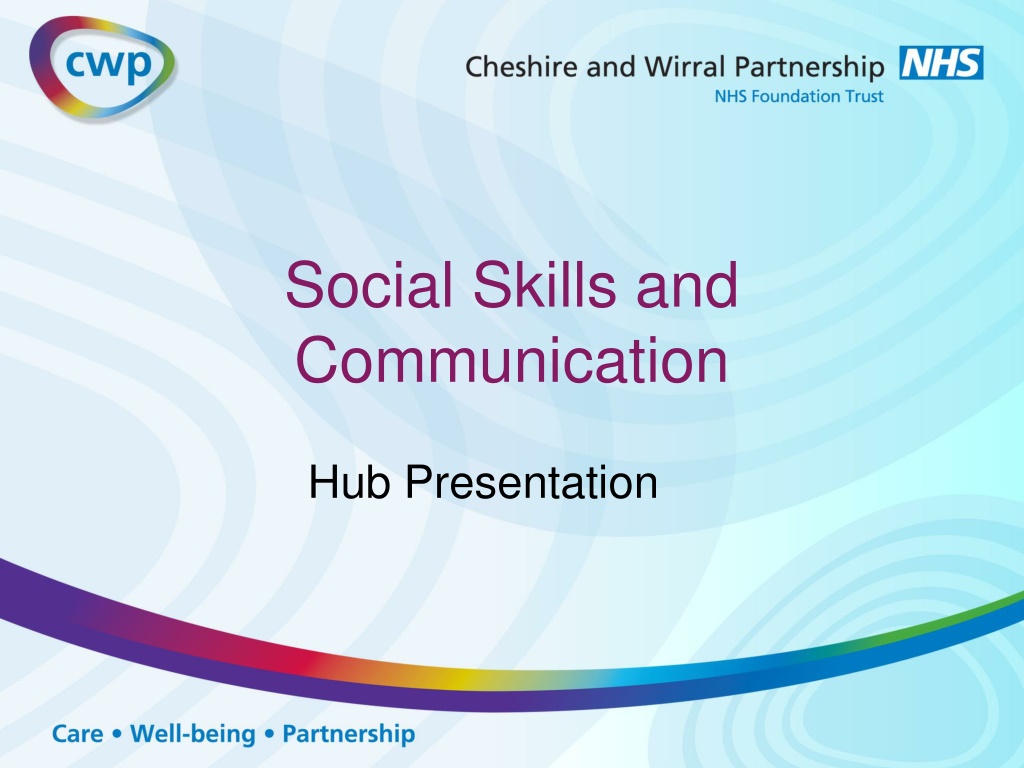
 undefined
undefined




